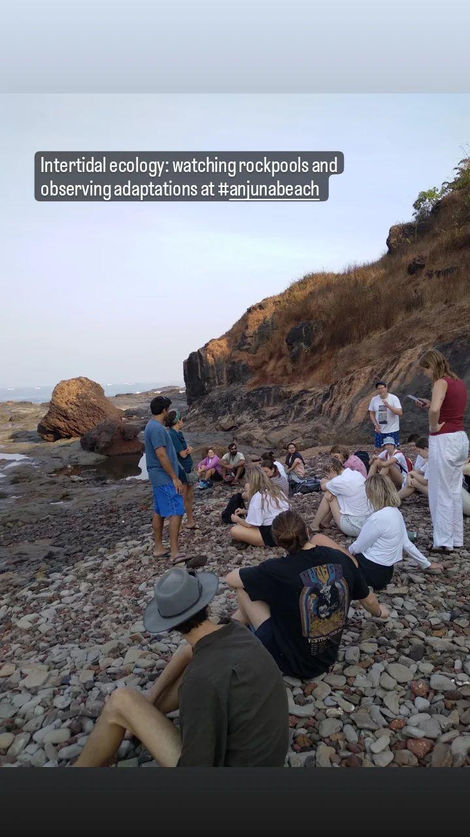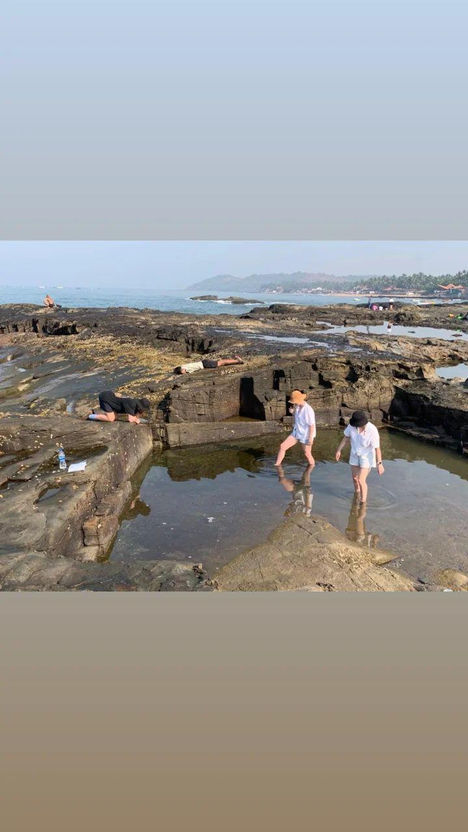

Page Title
This is a Paragraph. Click on "Edit Text" or double click on the text box to start editing the content and make sure to add any relevant details or information that you want to share with your visitors.

We work with schools and universities to create place-based itineraries. This process involves working closely with students and faculties to map learning objectives, academic disciplines, learning methods to the site specific opportunities.
OUR PROCESS

ACADEMIC FIELDS, SKILLS & METHODS
By immersing diverse ecosystems and living classrooms and laboratories students
will engage in multiple skills through their interdisciplinary exploration.
METHODS & SKILLS
Scuba Diving & Snorkeling
Biology Experimentation
Field Journaling - techniques of documentation in field biology
Cartography
Biodiversity sampling
Scientific Questioning and Reasoning
Photography and Videography
Creative Communication
Design Thinking
Maritime Navigation
ACADEMIC DISCIPLINES
Ecological Sciences
Biodiversity Conservation
Social & Political Ecology
Human Geography
Connected History
Resume of Field Expeditions
University of
Wollongong
2024
Tamil Nadu, India
“Kaleidoscopic Palk-strait”
From the bustling fishing villages that dot the coastlines to complex mangrove forests teeming with life, each element of Palk Bay's ecosystem serves as a muse for poetic prose and ecological explorations . Beyond its natural allure, Palk Bay's historical significance invites geographersand artists to to unravel the tales of cultural exchange, trade routes, marine foraging and ancients that thrived along its waters. The seamless interplay of land and water with people straddling their lives across it makes this an incredibly vibrant living classroom to learn new tools fordocumentation and research, methods for writing and asking questions, but most of all to see a 'place' from diverse perspectives.
University of Wollong
2023
Goa, India
“Fish & Ships - Poetic Science and the Indian Ocean"
If Australia and India are not separated but connected by the ocean, then conceptually ‘Fish and Ships’ are travelling emblems of this link. Their journeys cross the contours of the physical geography between the two land masses, leaving marks on the history of societies and landscapes in the Indo-Pacific. The course is designed to collaboratively study the ecological and anthropological currents through stories, futures of the sea-scape. The coasts of Goa in India and New South Wales in Australia have parallel histories of colonisation, contemporary issues connected to the extractive economies of coal and fisheries,set against the production of picture postcard tourism. Therefore,the theme offers windows for field research and material creation for students of Human Geography and Creative Writing through a crosspollination of ideas between them.
University of
Wollongong
2019
Phang Nga Bay, Thailand
“Writing the Ocean”
In this innovative cross-faculty project, geography and creative writing students teamed up for a marine and coastal immersion program, delving into the Andaman Sea and coastal regions of Thailand. Collaborating with Asian researchers, practitioners, and cultural experts actively engaged in the region, students honed key academic skills through field observations, critical analysis, and practice-led research and communication. Immersed in intensive content on socio-natural processes, the Andaman Sea offered visually and ecologically stunning landscapes, providing insights into the intricate social and environmental dynamics of the area. Students navigated these complexities aboard the 35m research vessel Diva Andaman, a meticulously restored traditional Thai sailing vessel, engaging with Thai crew members to learn maritime history and traditions while contributing to course planning, weather monitoring, tides, and navigation. Coastal exploration focused on Phanum Bencha National Park and similar locales, led by local experts to delve into rainforest ecological processes, Indigenous livelihoods, tourism impacts, and resource extraction challenges.
*The projects above were supported by the New Colombo Plan
Mallya Aditi
International
School
2019
Goa, India
“Ridge to Reef - Field Biology & Conservation"
This course is designed around a 60 km transect from the “Ridge to Reef” from the Western Ghats to Intertidal on the coast of Goa. Through the medium of nature journaling students will practice multiple techniques of ecological sampling across these diverse ecosystems, honing their skills of keen observation and detailed documentation.
By engaging in debates about development versus conservation that manifest in these landscapes students will be introduced to the many themes that connect to the IGCSE curriculum as well as ‘Global Perspectives’ in particular.. This course combines concepts from physical and human geography, field-biology and conservation.
Mallya Aditi International
School
2018
Coorg, India
Rainforest Ecology - 101
Participants were guided through the basics of forest ecology through various modes of place-based explorations. They embarked on walks to observe and document ecological transitions, forest composition, biodiversity inter-connections, and inter-dependence, as well as engaged in ethno-botanical investigations and learned about ecological farming techniques. The course was mostly tailored to suit the interests and motivations of the participants who signed up. A mix of formal training and casual discussions around the dining table to share experiences and debate was a core part of this learning experience.
Helsinki School
of Arts
2016
Andaman Islands, India
“Ecosystems in Change"
During the two-week expedition, participants explored the post-catastrophic landscapes across India's Coramandel Coast and Andaman Islands. Investigating through an artistic lens combined with scientific methods, the course aimed to document the stories of changing ecosystems and cultures. The concept of translocality was at the center of the course, as students were encouraged to juxtapose what they saw to examine post-catastrophic landscapes of Scandinavia. The objective of the course was to understand the potential for site and situation-specific art. Throughout the explorations, students engaged in thought processes related to creating works that were either integrated or reflected their surroundings, exploring their relationship to the topography of their locale, ecosystems, weather, communities, local history, and culture. The central objective of the course was to initiate an artistic response to questions, impacts, and the meaning of ecological change, problems, and potential futures.
Geometry of Ideas
2020
Online
Research methodology & process-portfolio development
The course provided an opportunity for students to merge their interests with academic pursuits and apply them to a broader context. It catered to those who sought a 'full-stack' approach to learning, where they could bring their ideas to life from conception to execution. Participants delved into the creative process of their work, learning to unpack and highlight their ideas through the multi-perspective approach fostered at EarthCoLab. The curriculum appealed to students who aimed to go beyond mere content and output, focusing instead on developing skills and critical thinking that facilitated the creation of meaningful work, collaboration, and personal satisfaction.
IN THE FIELD






